| Всем привет! | Hello everyone! |
| 1 мая 2024 года мы с подругой были в поездке по восточной Беларуси. Это был последний день нашего путешествия, очень насыщенный и интересный. В Красном береге мы увидели удивительную усадьбу, похожую на сказочный замок. | On May 1, 2024, my friend and I were on a trip to eastern Belarus. It was the last day of our trip, very eventful and interesting. In Krasny Bereg we saw an amazing estate, similar to a fairy-tale castle. |
| Но эти места связаны со страшной страницей истории. Во время Великой отечественной войны в этом самом удивительном замке располагался немецкий госпиталь. А рядом концентрационный лагерь для детей. Часть детей направляли в госпиталь как доноров крови. Детей от 8 до 14 лет насильно забирали у родителей в окрестных районах. Через лагерь в Красном береге прошли 1990 детей. | But these places are associated with a terrible page of history. During the Great Patriotic War, a German hospital was located in this most amazing castle. And next to it was a concentration camp for children. Some children were sent to the hospital as blood donors. Children from 8 to 14 years old were forcibly taken from their parents in the surrounding areas. 1990 children passed through the camp in Krasny Bereg. |
| В 2007 году здесь был открыт мемориал в память детей-жертв фашизма. | In 2007, a memorial was opened here in memory of children victims of fascism. |
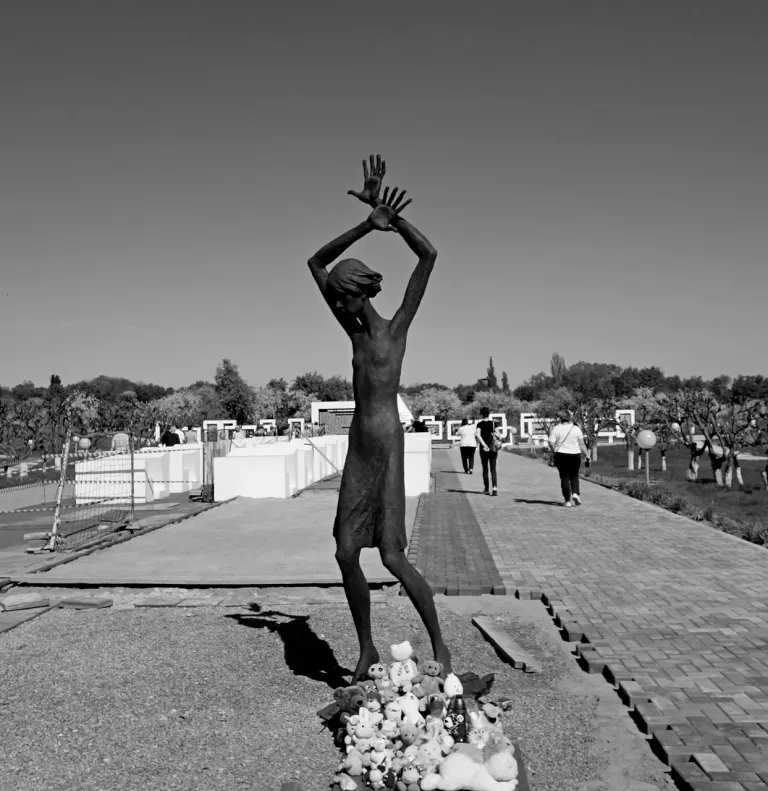 click on the image to see a bigger version of it
click on the image to see a bigger version of it
| Мемориал создавался по руководством архитектора Леонида Менделевича Левина. | The memorial was created under the supervision of architect Leonid Mendelevich Levin. |
| Вокруг растет яблоневый сад, который весь был в цвету, когда мы туда подъехали. На мемориале велись реставрационные работы, но и в таком виде он оставил неизгладимое впечатление. | There is an apple orchard growing around, which was in full bloom when we arrived there. Restoration work was underway on the memorial, but even in this state it left an indelible impression. |
| У ног центральной фигуры мемориала - тоненькой девочки-подростка, закрывающейся руками от ужаса, – сложены принесенные посетителями детские игрушки. | At the feet of the central figure of the memorial - a thin teenage girl covering with hands in horror - children's toys brought by visitors are piled. |
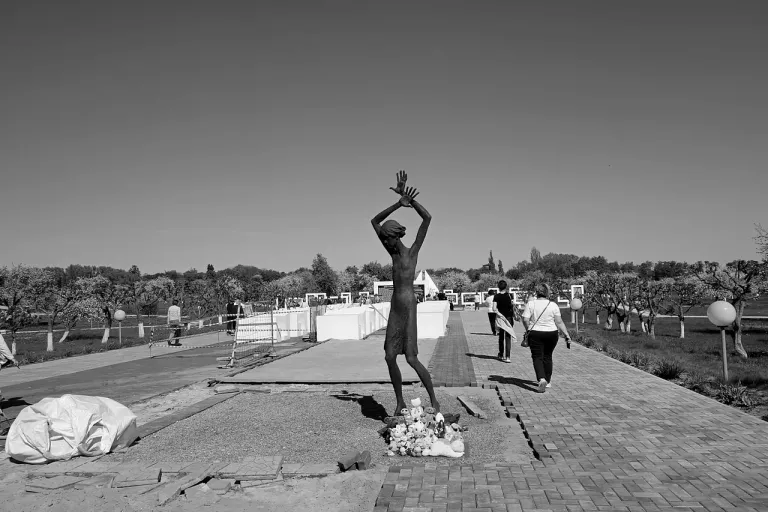 click on the image to see a bigger version of it
click on the image to see a bigger version of it
| Рядами стоят стилизованные школьные парты «Мёртвого класса», за которыми никто не сидит. | Stylized school desks of the "Dead Class" stand in rows, with no one sitting at them. |
| На большой плите – школьной доске - высечено найденное в 1944 году в белорусском городе Лиозно спрятанное за печкой письмо. | On a large slab - a school board - a letter found in 1944 in the Belarusian city of Liozno, hidden behind a stove, is carved. |
| ПИСЬМО 15-ЛЕТНЕЙ ДЕВОЧКИ КАТИ СУСАНИНОЙ С ФАШИСТСКОЙ КАТОРГИ | LETTER FROM 15-YEAR-OLD GIRL KATYA SUSANINA FROM A FASCIST HARD PRISON |
Дорогой, добрый папенька! Пишу я тебе письмо из немецкой неволи. Когда ты, папенька, будешь читать это письмо, меня в живых не будет. И моя просьба к тебе, отец: покарай немецких кровопийц. Это завещание твоей умирающей дочери. Несколько слов о матери. Когда вернешься, маму не ищи. Ее расстреляли немцы. Когда допытывались о тебе, офицер бил ее плеткой по лицу. Мама не стерпела и гордо сказала: «Вы не запугаете меня битьем. Я уверена, что муж вернется назад и вышвырнет вас, подлых захватчиков, отсюда вон». И офицер выстрелил маме в рот... Папенька, мне сегодня исполнилось 15 лет, и если бы сейчас ты встретил меня, то не узнал бы свою дочь. Я стала очень худенькая, мои глаза ввалились, косички мне остригли наголо, руки высохли, похожи на грабли. Когда я кашляю, изо рта идет кровь — у меня отбили легкие. А помнишь, папа, два года тому назад, когда мне исполнилось 13 лет? Какие хорошие были мои именины! Ты мне, папа, тогда сказал: «Расти, доченька, на радость большой!» Играл патефон, подруги поздравляли меня с днем рождения, и мы пели нашу любимую пионерскую песню... А теперь, папа, как взгляну на себя в зеркало — платье рваное, в лоскутках, номер на шее, как у преступницы, сама худая, как скелет,— и соленые слезы текут из глаз. Что толку, что мне исполнилось 15 лет. Я никому не нужна. Здесь многие люди никому не нужны. Бродят голодные, затравленные овчарками. Каждый день их уводят и убивают. Да, папа, и я рабыня немецкого барона, работаю у немца Шарлэна прачкой, стираю белье, мою полы. Работаю очень много, а кушаю два раза в день в корыте с «Розой» и «Кларой» — так зовут хозяйских свиней. Так приказал барон. «Русс была и будет свинья»,— сказал он. Я очень боюсь «Клары». Это большая и жадная свинья. Она мне один раз чуть не откусила палец, когда я из корыта доставала картошку. Живу я в дровяном сарае: в комнату мне входить нельзя. Один раз горничная полька Юзефа дала мне кусочек хлеба, а хозяйка увидела и долго била Юзефу плеткой по голове и спине. Два раза я убегала от хозяев, но меня находил ихний дворник. Тогда сам барон срывал с меня платье и бил ногами. Я теряла сознание. Потом на меня выливали ведро воды и бросали в подвал. Сегодня я узнала новость: Юзефа сказала, что господа уезжают в Германию с большой партией невольников и невольниц с Витебщины. Теперь они берут и меня с собою. Нет, я не поеду в эту трижды всеми проклятую Германию! Я решила лучше умереть на родной сторонушке, чем быть втоптанной в проклятую немецкую землю. Только смерть спасет меня от жестокого битья. Не хочу больше мучиться рабыней у проклятых, жестоких немцев, не давших мне жить!... Завещаю, папа: отомсти за маму и за меня. Прощай, добрый папенька, ухожу умирать. Твоя дочь Катя Сусанина... Мое сердце верит: письмо дойдет. 12 марта 1943 г. |
Dear, kind daddy! I am writing you a letter from German captivity. When you, daddy, read this letter, I will not be alive. And my request to you, father: punish the German bloodsuckers. This is the last will of your dying daughter. A few words about mother. When you return, do not look for mother. The Germans shot her. When they asked about you, the officer beat her in the face with a whip. Mother could not stand it and proudly said: "You will not intimidate me with beatings. I am sure that my husband will come back and throw you, vile invaders, out of here." And the officer shot mother in the mouth... Daddy, today I turned 15 years old, and if you met me now, you would not recognize your daughter. I have become very thin, my eyes have sunken, my pigtails have been cut bald, my hands have dried up, they look like rakes. When I cough, blood comes out of my mouth - my lungs have been knocked out. Do you remember, Dad, two years ago, when I turned 13? What a wonderful name day I had! You told me then, Dad: "Grow up, my daughter, for the joy of the great!" The gramophone was playing, my friends were congratulating me on my birthday, and we were singing our favorite pioneer song... And now, Dad, when I look at myself in the mirror - a torn dress, in rags, a number on my neck, like a criminal, I am as thin as a skeleton - and salty tears flow from my eyes. What's the point that I turned 15. Nobody needs me. Many people here are not needed by anyone. They wander around hungry, hunted down by German shepherds. Every day they are taken away and killed. Yes, dad, and I am the slave of a German baron, I work for a German named Charlene as a laundress, I wash clothes, wash floors. I work a lot, and I eat twice a day in a trough with "Rose" and "Clara" - that's what the master's pigs are called. That's what the baron ordered. "Russ was and will be a pig," he said. I am very afraid of "Clara". She is a big and greedy pig. She almost bit off my finger once when I was getting potatoes out of the trough. I live in a woodshed: I am not allowed to enter the room. One time, the Polish maid Jozefa gave me a piece of bread, and the mistress saw and beat Jozefa on the head and back with a whip for a long time. I ran away from the masters twice, but their janitor found me. Then the baron himself tore off my dress and kicked me. I lost consciousness. Then they poured a bucket of water on me and threw me into the basement. Today I learned the news: Yuzefa said that the gentlemen are leaving for Germany with a large party of slaves from the Vitebsk region. Now they are taking me with them. No, I will not go to this thrice-cursed Germany! I decided to die on my native land rather than be trampled into the cursed German soil. Only death will save me from a cruel beating. I do not want to suffer any longer as a slave to the cursed, cruel Germans who did not let me live!... I bequeath, dad: avenge mom and me. Farewell, good daddy, I am leaving to die. Your daughter Katya Susanina... My heart believes: the letter will reach. March 12, 1943 |
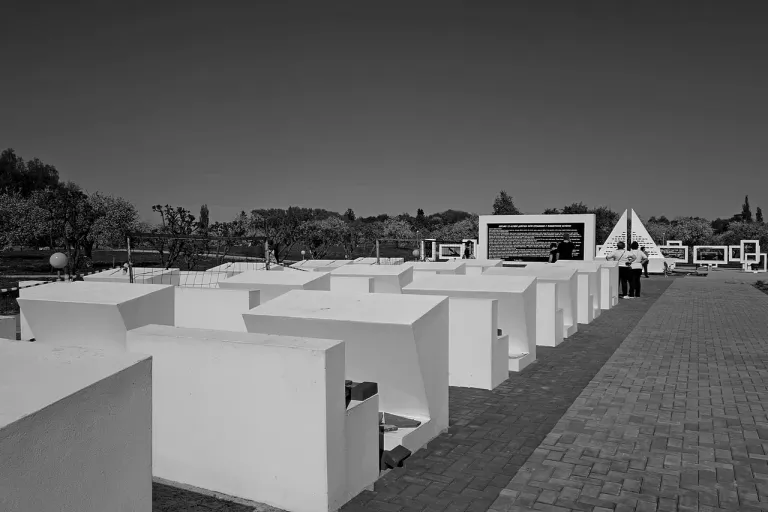 click on the image to see a bigger version of it
click on the image to see a bigger version of it
| На белых парусах «бумажного» кораблика написаны детские имена. | The white sails of the "paper" boat have children's names written on them. |
| За корабликом вставлены в рамки витражи, созданные на основе послевоенных детских рисунков. Эти рисунки хранились в семье Сергея Каткова, художника-фронтовика, который сразу после войны через живопись пытался заставить детей забыть о разрухе и боли. Он учил их рисовать. | Behind the boat, there are stained glass windows in frames, created based on post-war children's drawings. These drawings were kept by the family of Sergei Katkov, a war veteran artist who, immediately after the war, tried to make children forget about the devastation and pain through painting. He taught them to draw. |
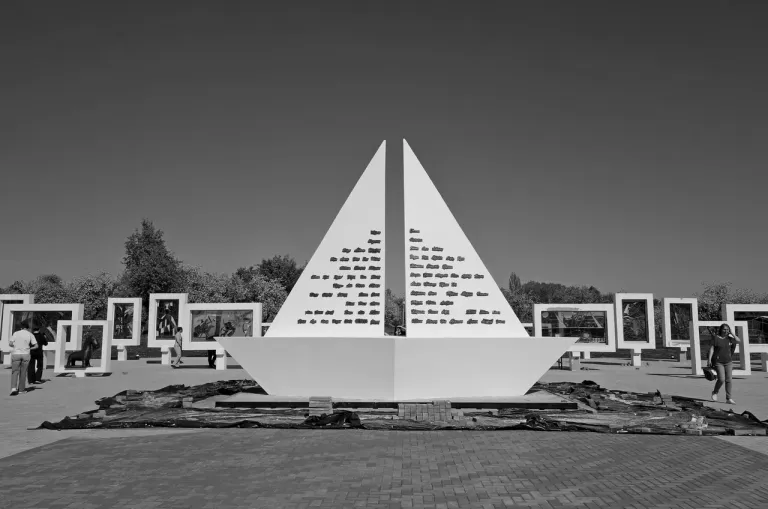 click on the image to see a bigger version of it
click on the image to see a bigger version of it
| 1ую фотографию я представляю на конкурс PhotoFeed Contest - Black & White Photography Round 92 от @photofeed | This is my entry to PhotoFeed Contest - Black & White Photography Round 92 hosted by @photofeed |
Camera Sony RX-100.
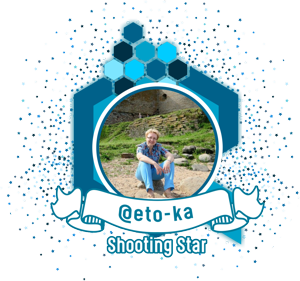.png)